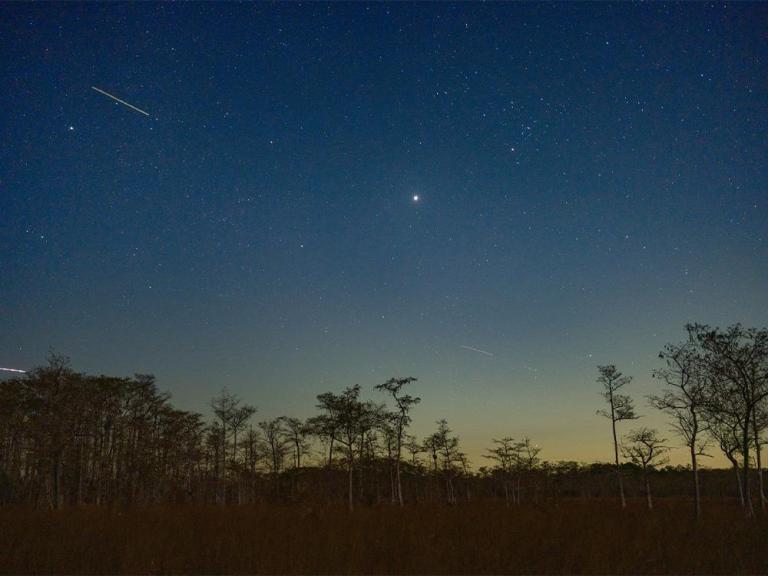Why Dark Skies Matter: Behind the Scenes of Big Cypress with Ranger Jessica Borders

When most people think of Big Cypress National Preserve, their minds go straight to the swamp. But for National Park Ranger Jessica Borders, the real magic begins after sunset. “Not everyone knows…when they think of Big Cypress, they think of swamp, they don’t think of stars,” she says. “So we are here to change that assumption!”
As part of the Environmental Education and Outreach Program at Big Cypress, Jessica has made it her mission to shift that perspective—one stargazer at a time. Through ranger-led dark sky programs, community engagement, and a lot of behind-the-scenes work, she’s helping visitors see the preserve in an entirely new light—or rather, lack of it.
What Makes Big Cypress So Special for Stargazing?
Big Cypress National Preserve earned its designation as an International Dark Sky Park in 2016, and it didn’t happen overnight. “Big Cypress National Preserve is an International Dark Sky Park because we met all of the criteria by DarkSky International,” Jessica explains. “We’re the first national preserve in the National Park System as well as the first national preserve to be designated an International Dark Sky Park.”
To reach that milestone, the preserve had to overhaul much of its lighting infrastructure. That included swapping out traditional bulbs for amber-colored, shielded lights and conducting monthly light readings across the preserve’s 729,000 acres. “To maintain our designation, there are a lot of rules in place when it comes to light pollution as well as the type of lighting to be used,” she says. A formal report is submitted annually to ensure the preserve stays in compliance.
“The dark skies at Big Cypress National Preserve are unique compared to other Dark Sky Places because of our location, primarily,” Jessica adds. Situated between the glow of Naples, Marco Island, and the greater Miami area, Big Cypress is easily accessible—yet it remains remarkably dark. “Visitors are often surprised at how little light pollution there is and how exceptionally dark Big Cypress is.”

A Quick Trip to Total Darkness
“You can travel less than 45 minutes from Naples or Marco Island down 41, the Tamiami Trail, and be in the heart of Big Cypress,” Jessica says. It’s a quick escape from the buzz of the city into an entirely different world—one where the Milky Way stretches above you, and the quiet hum of nocturnal life surrounds you.
“An International Dark Sky Place is an area in the world that is designated to protect the night skies for all who may want to use them, whether that be visitors, tribes who use guidance from the night sky, or nocturnal wildlife that need the night sky in order to survive,” Jessica explains. “You would think a lot of people would be scared of the dark, but it’s really peaceful! You feel guided by the night sky.”
The preserve offers winter astronomy programs where visitors can spend an evening under the stars with a ranger who shares insights on constellations, space science, and more. “You don’t need to be a NASA scientist to come out here and enjoy the night sky,” Jessica says. “All you need is a blanket...and maybe bug spray!”
A Place for Everyone Under the Stars
Whether you're planning a visit to learn about constellations or to simply enjoy a quiet night under the stars, the preserve offers meaningful experiences for all kinds of visitors. “There are tons of opportunities to witness things in the natural world that we take for granted,” Jessica says. “The amount of stars you’re able to see here, you might not be able to see in an urban place.” And, after all, there’s still a chance you’ll spot something no one has seen before. “Amateur astronomers are discovering new things about the night sky every day,” she adds.
Jessica encourages new visitors to explore Big Cypress both during the day and at night. “Although it’s the same geographical location, it’s two different experiences,” she says. “During the daytime, it provides lots of beautiful scenery, but during the nighttime, it provides opportunities to see nocturnal wildlife, lots of activity, lots of opportunity to see our beautiful clear night skies and even the Milky Way.”
She believes preserving dark skies is essential now and in the future. “It’s for the benefit of future generations,” she says. “Nature is healing, and nature provides a lot of benefits.” And at the end of the day—or the night—Jessica hopes every visitor walks away with something more profound: “a curiosity to learn more,” she says with a smile.